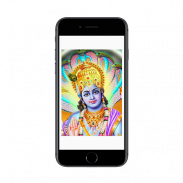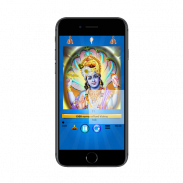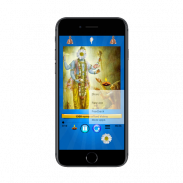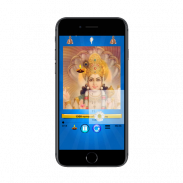







vishnu chalisa mantra hd audio

وصف لـvishnu chalisa mantra hd audio
Vishnu (Sanskrit pronunciation: [vɪʂɳu]; Sanskrit: विष्णु, Viṣṇu) is one of the most significant deities in Hinduism. He is the Supreme God Svayam Bhagavan of Vaishnavism (one of the principal denominations of Hinduism). He is also known as Narayana and Hari. As one of the five primary forms of God in the Smarta tradition, he is conceived as "the Preserver or the Protector".
In Hindu sacred texts, Vishnu is usually described as having the dark complexion of water-filled clouds and having four arms. He is depicted as a pale blue being, as are his incarnations Rama and Krishna. He holds a padma (lotus flower) in his lower right hand, the Kaumodaki gada (mace) in his lower left hand, the Panchajanya shankha (conch) in his upper right hand and the discus weapon considered to be the most powerful weapon according to Hindu Religion Sudarshana Chakra in his upper left hand.
Vishnu is one of the three main gods in Hinduism. Vaishnavas believe that Vishnu is the highest God. Vishnu is the preserver god, which means he protects the earth from being destroyed and keeps it going, according to this religion, and he has come to earth in nine forms (called avatars) so far, with one yet to come. His most famous forms are Rama and Krishna. Vishnu's wife is Lakshmi, the Hindu goddess of fortune.
Vishnu is usually shown with light blue skin and four arms. He holds a lotus, mace (gada), conch (shankha) and disc (chakra) in each of four hands.
Few famous Vishnu Mantras:
Vishnu Gayatri Mantra विष्णु गायत्री मंत्र
1008 names of lord Vishnu भगवान विष्णु के 1008 नाम
Sri Vishnu Sahastranam विष्णु सहस्त्रणम
Vishnu Chalisa विष्णु चालीसा
108 names of lord Vishnu भगवान विष्णु के १०८ नाम
Lord Vishnu Mool Mantra भगवान विष्णु मूल मंत्र
Mangalama Bhagwan Vishnu मंगलम भगवान विष्णु
Vishnu Stotram विष्णु स्तोत्रम
Vishnu SahsatranamStotram विष्णु सहस्त्रनामस्तोत्रम
Shanta Karam शांता करम
Vishnu Vandana विष्णु वंदना
Chanting to the mantras of lord Vishnu will help you get more peace and money in life. All the troubles and evils will get removed by chanting of Vishnu mantras.
There are ten avatars of Vishnu (in the order they appeared):
* Matsya (Fish)
* Kurma (Turtle)
* Varaha (Boar)
* Narasimha (half Lion, half Man)
* Vamana (Pygmy / Dwarf / Short man)
* Parashurama (Fierce man / Hunter)
* Rama (Developed man / Ideal man / Fighter)
* Krishna (Cowherd Prince)
* Different branches of Hindu tradition accept two different figures as the 9th avatar of Vishnu:
* Balarama (Physically advanced man)
* Buddha (Intellectual and scientific man)
* Kalki (future avatar, has not appeared yet)
Vishnu was not a major deity in the Vedic period. A few Rigvedic hymns (c. 1400–1000 bce) associate him with the Sun, and one hymn relates the legend of his three strides across the universe, which formed the basis of the myth of his avatar Vamana, the dwarf. Legends of figures that later became other avatars, such as the fish that saves humankind from a great flood, are also found in the early literature. By the time of the Mahabharata (the great Sanskrit epic that appeared in its final form about 400 ce), the avatars began to be identified with Vishnu. Vishnu is said to manifest a portion of himself anytime he is needed to fight evil and to protect dharma (moral and religious law). Not all avatars are wholly benevolent; some, such as Parashurama (Rama with the Ax) and Krishna, bring about the deaths of many innocent people, and the Buddha corrupts the pious antigods. Vishnu’s vahana, his vehicle in the world, is the eagle Garuda; his heaven is called Vaikuntha.





















